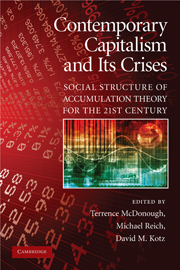Book contents
- Frontmatter
- Contents
- List of Tables
- List of Figures
- List of Contributors
- Acknowledgments
- Introduction: Social Structure of Accumulation Theory for the 21st Century
- PART I THE THEORY OF SOCIAL STRUCTURES OF ACCUMULATION
- PART II GLOBALIZATION AND THE CONTEMPORARY SOCIAL STRUCTURE OF ACCUMULATION
- 4 Global Neoliberalism and the Contemporary Social Structure of Accumulation
- 5 Globalization or Spatialization? The Worldwide Spatial Restructuring of the Labor Process
- 6 Financialization in the Contemporary Social Structure of Accumulation
- 7 Global Neoliberalism and the Possibility of Transnational State Structures
- PART III THE CONTEMPORARY SOCIAL STRUCTURE OF ACCUMULATION IN THE UNITED STATES
- PART IV SOCIAL STRUCTURE OF ACCUMULATION THEORY AND TRANSFORMATIONS OF THE CAPITALIST PERIPHERY
- Index
- References
7 - Global Neoliberalism and the Possibility of Transnational State Structures
Published online by Cambridge University Press: 05 June 2012
- Frontmatter
- Contents
- List of Tables
- List of Figures
- List of Contributors
- Acknowledgments
- Introduction: Social Structure of Accumulation Theory for the 21st Century
- PART I THE THEORY OF SOCIAL STRUCTURES OF ACCUMULATION
- PART II GLOBALIZATION AND THE CONTEMPORARY SOCIAL STRUCTURE OF ACCUMULATION
- 4 Global Neoliberalism and the Contemporary Social Structure of Accumulation
- 5 Globalization or Spatialization? The Worldwide Spatial Restructuring of the Labor Process
- 6 Financialization in the Contemporary Social Structure of Accumulation
- 7 Global Neoliberalism and the Possibility of Transnational State Structures
- PART III THE CONTEMPORARY SOCIAL STRUCTURE OF ACCUMULATION IN THE UNITED STATES
- PART IV SOCIAL STRUCTURE OF ACCUMULATION THEORY AND TRANSFORMATIONS OF THE CAPITALIST PERIPHERY
- Index
- References
Summary
In Chapter 4, David Kotz and one of the present authors argue that the resolution of the crisis of the1970s and early 1980s involved the construction of a new social structure of accumulation (SSA). This new SSA is best characterized as one of global neoliberalism. Kotz and McDonough argue that neoliberalism in this period constituted a multileveled phenomenon that included neoliberal institutions, neoliberal policies, neoliberal theories, and neoliberal ideology. Among neoliberal policies, the aggressive attempt to remove any barriers to the free movement of goods and capital across borders was especially prominent. This provides one of the many links between neoliberalism and globalization. Neoliberalism promoted globalization, and globalization in a dialectical fashion was also at the root of support by capital for the new neoliberal orientation. Increasing international competition undermined profitability. Capital began to pursue a program of deregulation and capital flight as a means to recover profitability. Further, the resultant globalization of production weakened labor and strengthened capital's ability to effectively pursue its newly preferred strategy.
Transformations at the level of the state must be counted among the prominent institutions of this global neoliberalism. Indeed the contemporary changes in domestic state structures and policy have attracted a great deal of analysis. Globalization is easily identified as an influence on these changes. International “competitiveness” has become the stated rationale for government policy in all areas of social life.
- Type
- Chapter
- Information
- Contemporary Capitalism and its CrisesSocial Structure of Accumulation Theory for the 21st Century, pp. 168 - 192Publisher: Cambridge University PressPrint publication year: 2010
References
- 3
- Cited by



